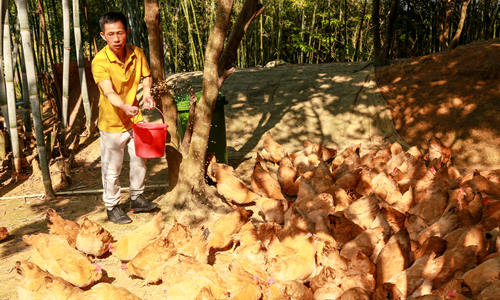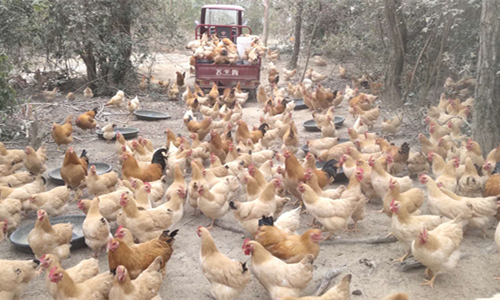Chinese wildlife farmers shift business amid trade ban with government’s poverty-reduction policies
By Huang Lanlan Source:Global Times Published: 2020/4/27 20:30:26

A wildlife farmer in Heyuan, South China's Guangdong Province, shifts to raise hens under government support (photo: Courtesy of Yuan Dingyang)
China's move to ban wildlife trade amid the COVID-19 epidemic left some farmers raising animals for living with an economic dilemma. Local governments have assisted them to reach goals in poverty reduction work, as China vows to eradicated poverty domestically by the end of 2020.In late February, the National People's Congress (NPC), China's top legislature, adopted a decision which prohibits the consumption of terrestrial wild animals under state protection, including those that are bred or reared in captivity.
Li Boan has planned to buy 2,000 to 3,000 chickens after his business of raising bamboo rats, a food ingredient in some southern China regions, was halted according to the regulation.
Li said he was initially sad in March, when his 500 bamboo rats were disinfected and buried because of the government's ban on trading all wildlife in the wake of the novel coronavirus (COVID-19) pandemic.
Li, a farmer in Heyuan city, South China's Guangdong Province, said the bamboo rats he had bred for two years could have earned him "a lot of money" if there was no wildlife trade ban.
Farmers like Li who rear wild animals for meat therefore have to give up their business, facing huge financial pressures.
To help these wild animal raising farmers to survive the financial crisis, Heyuan authority is guiding and teaching them to shift their business, said Yuan Dingyang, an official with Heyuan poverty-alleviation bureau.
"We attach great importance to this issue," Yuan told the Global Times, adding that poverty-alleviations officials across Heyuan's counties and villages had visited every wildlife-breeding household by late February to listen to their difficulties and persuade them to switch to other businesses.
In Li's Dongyuan county of Heyuan, for instance, government had assigned experts to teach wildlife-raising farmers to breed hens, grow mushrooms or brew wines instead, Yuan said.
Li is turning to raise hens under government's technical support. He plans to buy chickens, which may create 30,000yuan of profit after months of raising.
"That profit is less than breeding and trading bamboo rats," Li told the Global Times, adding that his 500 bamboo rats could earn him at least 100,000 yuan of net income each year. "But raising hens is the best choice for me right now."

Hens that Li Boan raises (photo: Courtesy of Li)
Dongyuan county government had also spent 2 million yuan in financially helping Li and other wildlife-rearing farmers. Li said he had got a subsidy of 30,000 yuan to stop raising bamboo rats.What assures the affected farmers more is that government is trying a variety of ways to make their new businesses profitable. Poverty-alleviation officials in Dongyuan, reached a mushroom processing company which had promised to regularly buy mushrooms from local growers at reasonable price, Yuan mentioned.
In some regions of China, wildlife breeding used to be a government-encouraged industry for people living in poverty. In Heyuan, there are 785 former poverty-stricken people who reared wild animals such as bamboo rats and snakes to make a living, and the now-banned business had helped them got out of poverty in 2019, Yuan said.
The unexpected pandemic, however, has not only prompted legislators to halt the wildlife trade but also educate the general public not to eat wild animals.
To overcome the accompanying financial crisis, all of the 785 involved farmers in Heyuan had turned from wildlife rearing to other businesses with the help of local government by March, Yuan said. "What we will make efforts to do this year is to prevent them from falling back into poverty in the face of the ban," he added.
China has set a goal to uplift all citizens below the poverty line by the end of 2020. "I'm confident that Heyuan can meet the goal by turning the crisis into many opportunities in time," Yuan told the Global Times.
Posted in: IN-DEPTH